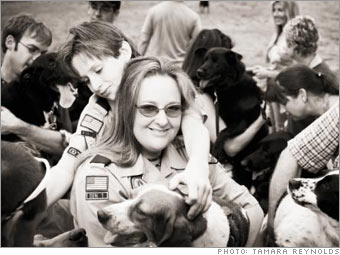Antioch, Tenn., resident Ann Rittenberry was devastated when the family beagle, Peanut, escaped through a hole in the backyard fence one night in December 2004. The dog had been a special gift to her son Justin at age eight, after his father passed away two years prior.
Rittenberry, 38, posted an ad in the paper, and a few days later a "Ron Barton" called from Atlanta to say he'd found Peanut at a Nashville truck stop and had taken the dog home. He offered to fly it back if Rittenberry would wire $85 for a pet carrier. She wired the money, but Peanut never arrived.
Barton, a.k.a. Andre Gould, was later convicted of wire fraud for conning people who'd lost pets out of some $20,000. Gould used mapping software to enable him to describe landmarks in his targets' neighborhoods. Moreover, by focusing on panicked pet owners, he caught people at a time when they were too distraught to look closely into his story.
"I was frantic," says Rittenberry. "I just wanted my son's dog back."
According to the NASD study, fraud victims are more likely than the rest of the population to have experienced a "negative life event" (such as the death of a loved one, a layoff or a divorce) in the previous three to five years.
"When something bad happens in your life, it chews up your cognitive abilities and your coping skills," says University of California-Santa Cruz psychology professor Anthony Pratkanis, who worked on the study.
HOW NOT TO BE A SUCKER That tragedy weakens your judgment is hardly news to financial planners, who've seen client after client make disastrous money decisions in the wake of personal loss. If you've suffered a blow, planners say, understand that it leaves you vulnerable and could very well draw con artists to your door.
The standard advice: Don't make any major financial commitments for six months after the death of a family member or other such crisis. If you can't wait, at least consult a trusted friend or financial counselor before acting.

DON'T make decisions after suffering a loss
|
|
